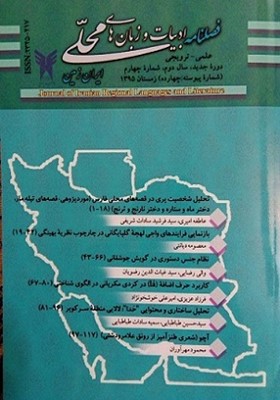The usages of the preposition (la) in Mokriyan dialect of Kurdish language in cognitive patterns
Subject Areas : ...farzad azizi 1 * , amir ali khoshkhoonejad 2
1 - ...
2 - ...
Keywords: cognitive linguistics, spatial propositions, Mokriyani dialect,
Abstract :
propositions which are of two types of simple and compoundin Mokriyan dialect which have the capabilities of being considered from the cognitive linguistics view and the present grammar of Kurdish language expresses the definitions, structure, and their meanings regardless a particular framework. According to the rules like conceptualizations and following the metaphoric patterns which are dominating over the languages, cognitive linguistics prepare a more accurate view over the meanings of the propositions in comparison to the traditional views, moreover, different meanings of the propositions are introduced in a systematic way in this approach. Kurdish language propositions and specially its Mokrian dialect variants have the capacity of being examined by cognitive approaches in which we here examine the (la). Its two simple and compound propositions are analyzed by the metaphoric patterns that are made by following the human body parts and the iconicity of the propositions which comes from the human mental images. This mentioned iconicity is created by modelling the familiar patterns for language users such as human body and physical shapes of this structure.
1.زاهدی، کیوان و عاطفه محمدی زیارتی.(1390). "شبکۀمعناییحرفاضافۀفارسی(از)درچهارچوبمعنیشناسیشناختی"، تازه های علوم شناختی،سال 13، شماره 1، صص:80-67.
2.سراجی اردستانی،م.(1388). بررسیمعناییحروفاضافهدرفارسیدرقالبنظریهمعناشناسیشناختی، پایان نامه کارشناسی ارشد زبانشناسی همگانی، دانشگاه آزاد اسلامی واحد تهران مرکز.
3.گلفام،ا. و یوسفی راد. (1385)." رویکرد معناشناسی شناختی به حروف اضافه مکانی زبان فارسی از منظرآموزشی، مطالعه موردی: حرف اضافه (در) ، نشریهپژوهشادبیاتمعاصرجهان"، سال 14، شماره 56، صص:179-167.
4.نقی زاده، محمود. (1390). بررسی چگونگی ساختاری شدن مفهوم فضا در زبان فارسی بر اساس زبان شناسی شناختی، پایان نامه دکتری زبان شناسی همگانی، دانشگاه اصفهان.
5.یوسفی راد، ف.(1387). بررسی شناختی زبان فارسی بانگاهی ویژه به حروف اضافه مکانی. پایان نامه دکتری زبانشناسی همگانی، دانشگاه تربیت مدرس.
6.یوسوپووا، د.زری. (2005). شیوه ی سلیمانی زمانی کوردی. ترجمه کوردستان موکریانی، هه ولیر، عیراق.
7.Evans, Vyvyan and Melanie Green (2006). Cognitive linguistics, an introduction, Edinburgh University Press.
8.Geeraerts, Dirk et al. (2008). Body, language and mind, volume 2, Mouton de Gruyter.
9.Huddleston Rodney, Pullum Geoffrey K (2002). The Cambridge grammar of the English language. Cambridge.
10.Lakoff, George and Mark Johnson (1980).Metaphors we live by. Chicago: Chicago University Press.
11.Lakoff, George (1987).Woman, Fire and Dangerous Things. Chicago: University of Chicago Press.
12.Lakoff,George and Mark Johnson(1999).Philosophy in the flesh: The embodied mind and Its challenge to western thought. New York: Basic Books.
13. Levinson, S. C., & Wilkins, D. P. (2006). Patterns in the data: Towards a semantic typology of spatial description, Max Planck Institute for Psycholinguistics.
14.Mackenzie, David N. 1961. Kurdish dialect Studies. London: Oxford University Press.
15.Navarro Ferrando, I. (2000). A Cognitive-semantic analysis the English lexical unit in. Cuadernos de investigación filológica.
16.Quirk, Randolph and Greenbaum, Sidney and Leech, Geoffrey and Svartvik, Jan.(1985). A Comprehensive Grammar of the English Language. London: Longman.
17.Ray,Jackendoff(1983).Semantics and Cognition. Cambridge, MA: MIT Press.
18.Saeed, Sameerah (2014). Place Relaters: English and Kurdish. Newcastle University, Newcastle upon tye.
19.Samvelian,pollet (2007).“A Lexical Account of Sorani Kurdish Prepositions”, the 14th International Conference on Head-Driven Phrase Structure Grammar. Stanford Department of Linguistics and CSLI’s.
20.Thackston,W.M. (2013). Sorani Kurdish: A Reference Grammar with Selected Readings, www.fas.harvard.edu.
21.Tyler Andrea and Vyvyan Evans (2003). The Semantics of English Prepositions. Spatial Scenes,Embodied Meaning and Cognition. Cambridge, Cambridge university press.
_||_

